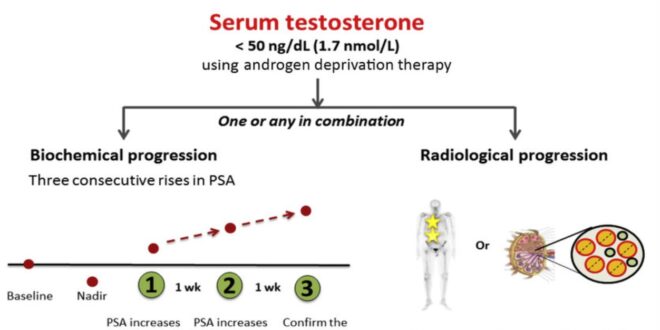Prostate cancer is one of the most common cancers affecting men worldwide, and in many cases, it can be controlled effectively with hormone therapy. However, some patients eventually develop a more advanced stage known as castration-resistant prostate cancer (CRPC). Understanding what this condition means is crucial for patients, families, and healthcare providers.
When people ask, “what does castration resistant prostate cancer mean?”, they are usually searching for clarity about why prostate cancer continues to grow despite treatments aimed at lowering testosterone. This stage of the disease requires specialized management, new treatment approaches, and careful monitoring to improve both survival and quality of life.
Definition and Overview
Castration-resistant prostate cancer (CRPC) refers to a form of prostate cancer that keeps growing even when testosterone levels are reduced to very low levels, either through surgery (orchiectomy) or medication (androgen deprivation therapy). In simpler terms, it is prostate cancer that no longer responds to hormone therapy.
This stage of the disease is often more aggressive, with a higher chance of spreading to other parts of the body such as bones, lymph nodes, or internal organs. CRPC is a key turning point in prostate cancer treatment, marking the need for more advanced therapeutic strategies.
Types
There are several subtypes of castration-resistant prostate cancer, including:
- Non-metastatic CRPC: The cancer resists hormone therapy but has not yet spread beyond the prostate.
- Metastatic CRPC (mCRPC): The cancer has spread to distant sites, most commonly bones and lymph nodes.
- Symptomatic and asymptomatic CRPC: Patients may or may not experience noticeable symptoms depending on disease progression.
Each type requires a tailored treatment plan to manage symptoms and slow disease progression.
Causes and Risk Factors
The main cause of CRPC is the ability of prostate cancer cells to adapt and continue using minimal amounts of androgens (male hormones) for growth. Even when testosterone levels are suppressed, cancer cells may find alternative pathways to thrive.
Risk factors that increase the likelihood of developing CRPC include:
- Advanced or aggressive prostate cancer at initial diagnosis
- Long-term use of androgen deprivation therapy (ADT)
- High PSA (prostate-specific antigen) levels despite treatment
- Genetic mutations such as BRCA1, BRCA2, or ATM
- Family history of advanced prostate cancer
Symptoms and Early Warning Signs
Patients often ask, “what does castration resistant prostate cancer mean in terms of symptoms?” The symptoms can vary but may include:
- Persistent or rising PSA levels despite hormone therapy
- Bone pain, often a sign of metastasis
- Fatigue, weight loss, or loss of appetite
- Urinary problems such as difficulty urinating or blood in the urine
- Swelling in the legs due to lymph node involvement
Recognizing these signs early can lead to timely medical interventions.
Diagnosis
Diagnosis of CRPC typically involves:
- PSA Testing: A consistent rise in PSA levels while on ADT is a strong indicator.
- Imaging Scans: Bone scans, CT scans, or MRI help detect metastases.
- Biopsy and Genetic Testing: These can reveal mutations that may guide targeted therapies.
Doctors usually confirm CRPC when PSA continues to rise despite low testosterone levels, and/or when new metastases are detected.
Treatment Options
Treatment for castration-resistant prostate cancer is multifaceted. Options include:
- Second-generation hormone therapies such as enzalutamide, abiraterone, apalutamide, or darolutamide
- Chemotherapy with drugs like docetaxel or cabazitaxel
- Immunotherapy such as sipuleucel-T for eligible patients
- Targeted therapies for those with genetic mutations (e.g., PARP inhibitors like olaparib)
- Radiopharmaceuticals for bone metastases (e.g., radium-223)
- Palliative treatments to manage pain and improve quality of life
A combination of these approaches is often used depending on the stage and health of the patient.
Prevention and Lifestyle Recommendations
While CRPC cannot always be prevented, healthy lifestyle choices can reduce risks and improve outcomes. Recommendations include:
- Maintaining a balanced diet rich in vegetables, fruits, and lean protein
- Staying physically active with regular exercise
- Managing weight and avoiding obesity
- Reducing alcohol intake and quitting smoking
- Following medical advice closely and attending regular follow-ups
These lifestyle changes support overall health and may enhance the effectiveness of treatments.
Prognosis and Survival Rates
The prognosis of CRPC varies depending on whether the cancer has spread and how well it responds to treatment. Non-metastatic CRPC generally has a better outlook compared to metastatic CRPC.
Advancements in therapy have significantly improved survival rates, with many patients living for several years after diagnosis. However, CRPC remains a serious condition that requires ongoing management.
Latest Research and Innovations
Recent studies have focused on:
- New drug developments that block alternative androgen pathways
- Immunotherapy advancements to boost the body’s natural defenses
- Genetic testing and precision medicine to personalize treatment
- Combination therapies that use multiple drugs for better results
- Novel imaging techniques for earlier detection of metastases
These innovations provide hope for extending survival and improving patient outcomes.
Coping and Support for Patients
Living with CRPC can be emotionally and physically challenging. Patients and families benefit from:
- Counseling and psychological support
- Participation in support groups and patient networks
- Palliative care for symptom management
- Open communication with doctors about treatment goals and expectations
- Exploring clinical trials for access to new therapies
Emotional well-being is just as important as physical health in managing this condition.
Conclusion
So, what does castration resistant prostate cancer mean for patients and families? It means facing a stage of prostate cancer that no longer responds to traditional hormone therapy, requiring advanced treatments and close medical supervision. Although CRPC can be aggressive, modern medicine offers a range of options that can extend life and improve quality of care.
With ongoing research, innovative therapies, and strong support systems, patients have more hope than ever before. Understanding this condition, staying informed, and working closely with healthcare professionals remain the keys to navigating castration-resistant prostate cancer effectively.
